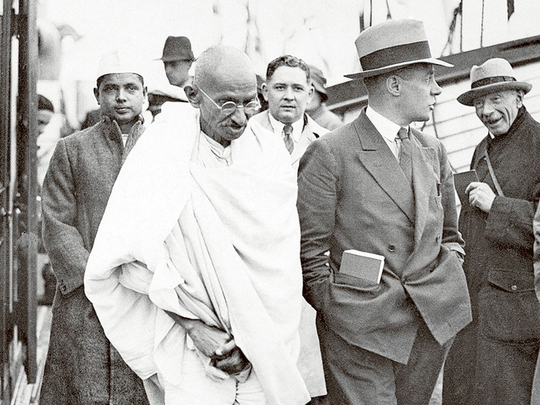
Everything in the world around us reminds us of Mahatma Gandhi (1869–1948), the historic leader who led India’s movement for independence from the British. Amidst the waves of violence, conflict, bloodshed, extremism, fanaticism and terrorism that have spread across our region, pitting people of different religions, cultures or sects against each other, we must remember the founder of pacifism, the one who called for coexistence among people regardless of their differences, promoted peace and rejected killing irrespective of its goal or purpose.
The whole world, with all its thinkers, decision-makers and peace lovers, is invited in revisiting Gandhi’s legacy and learning from his philosophy, which posits that “victory attained by violence is tantamount to defeat” and that victory in battle is determined not by “the number of adversaries we murder, but rather by our ability to kill in ourselves the desire to murder”. His other timeless statements in this respect include: “There are many causes for which I am prepared to die, but no cause for which I am prepared to kill,” and “There is no way to peace. Peace is the way.” Experience in recent decades has proved the validity of his ideas; conflicts and wars have not solved problems, and no sect or group in the world can eliminate another through the use of force. Killing has only led to more killing, violence has only brought more violence and extremism has generated even stronger counter-terrorism efforts.
Gandhi stood up to the British Empire, relying only on the strength of righteousness and the nobility of his ideals. He succeeded in achieving independence for his country and earned the respect of his enemies before his supporters. His approach inspired Nelson Mandela, who used it to rid South Africa of apartheid and transform it into a model of coexistence, stability and development. On the other hand, violent groups and forces throughout history have only created conflict and chaos in their countries and around the world and spread the seeds of tension and hostility among cultures, religions and sects.
Gandhi proved that coexistence is always possible no matter how many sects, religions, races and cultures there might be and that multiplicity is a source of richness and vitality in any given society. It is bad management that turns such multiplicity into a source of conflict and confrontation. Gandhi laid a strong foundation for coexistence in a society with hundreds of races, languages, cultures and beliefs, establishing that “difference of opinion should not lead to enmity”. Therefore, India owes to Gandhi for all its achievements over the past decades and the fact that it has become “the largest democracy in the world”. Meanwhile, several Arab countries with much less diverse societies than India are still suffering religious, sectarian and racial conflicts, which hinder their development and threaten their very existence. This is because these countries lack a national approach for managing such multiplicity on the basis of citizenship, looking beyond the differences and sharing one homeland.
The most important contribution by Gandhi, which earned him his place in the history of India and the world, was not only his nonviolent approach and call for coexistence and acceptance of the other, but also his strong will; he called for peaceful resistance against the British occupation and held on to his convictions for almost 50 years until his country became independent in 1947 — one year before his death. He became a model of humility and the defence of one’s principles. He even paid the price for those principles with his own life, when he was killed by an extremist Hindu who resented Gandhi’s defence of the Muslim minority in India. Gandhi was a victim of extremism, fanaticism and narrow-mindedness. Still, his approach highlights the corrupt thought of extremists and terrorists, no matter what their religion, sect, race or denomination, and their inability to offer anything other than bloodshed and destruction. Gandhi was a leader of Indians and all human beings, regardless of their religion, race or sect. Therefore, he is known as the “Father of the Nation” in India and nobody questions what sect, religion or race Gandhi belonged to. His humane thought went beyond borders and religions, sectarian and racial differences. Thus, his philosophy had an impact not only on India, but the whole world. That is why the United Nations marks his birthday, October 2, as the International Day of Nonviolence.










